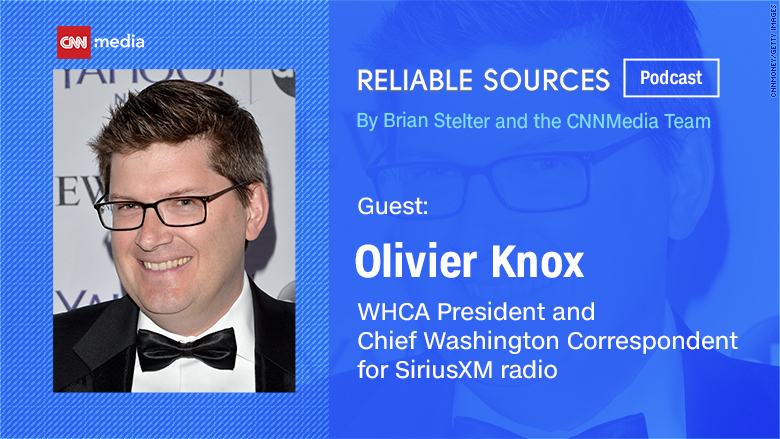
The daily White House press briefing is no longer routine. In fact, reporters can't even count on one weekly anymore. So far this month, there has only been one press briefing in total.
But communication between the President and the press has nonetheless continued, whether it's in the form of tweets, or impromptu news conferences on the White House lawn.
"This president's been awfully available," Olivier Knox, president of the White House Correspondents' Association told CNN's Brian Stelter for this week's Reliable Sources podcast. "And that reflects in part the fact that he has really been his own communications director."
That's not to say that press briefings no longer have value.
Press briefings are particularly important for smaller news outlets that do not typically get a lot of attention from the White House staff, as well as reporters who aren't covering the top story of the day, Knox said.
It is the White House Correspondents' Association's job to ensure that journalists have access to the White House. Knox said organization members have voiced concern about the decrease in press briefings, and he has brought these concerns to the attention of White House Press Secretary Sarah Huckabee Sanders.
"She's heard us out," Knox said, in response to Stelter asking why the association hasn't expressed more frustration on the issue. But projecting rage over the situation is not Knox's preferred route. "I don't think that the screaming really has a lot of value in that relationship. I would prefer to try to work productively through this" he said.
Listen to the whole podcast here:
The daily briefings have all but stopped under Trump, but Knox said they have had "ebbs and flows over time" in previous presidencies.
"I remember times when, you know, Obama would recede and we would pepper Jay Carney with questions about when he would next [take questions from the press]," he said. Carney served as former president Barack Obama's press secretary from 2011 to 2014.
There's something that concerns Knox more than the diminishing frequency of press briefings under the Trump administration.
"One of the things that this administration has done is claw back a lot of government information that was public in the Obama, Bush and even the Clinton years," he said.
He cited the War Powers Act as an example -- a law that requires a public letter be submitted to Congress by the President every six months, "laying out where American troops are in harm's way and how many of them are in harm's way." The current administration has eliminated the head count of Americans in Afghanistan, Syria and Iraq from the letter, Knox said.
"When you pull that kind of information out of the public eye, you're making the job of holding the federal government accountable more difficult," he said.
Last year, Olivier wrote about this issue, and said he was able to figure out how many American troops were in those specific places by going through Pentagon briefings and Pentagon documents.
With Pentagon briefings notably on the decline, it would make research like Knox's even more challenging. And the wars abroad are an issue he believes needs more spotlight.
"It's amazing how little scrutiny it's getting," he said. "Donald Trump inherited a lot of military conflicts. He's expanded a lot of them as well. And we can't forget this. We can't."


